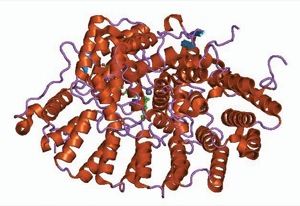October 2013
article authored by Christina Frangou
The majority of patients newly diagnosed with metastatic colorectal cancer (mCRC) in the United States have not undergone KRAS testing, despite recommendations to the contrary.
Only 47.5% of patients with mCRC who were diagnosed between Jan. 1 2008 and Dec. 31, 2011 underwent KRAS testing.
“This is extremely surprising,” said Sanjay Goel, MD, associate professor of medicine (oncology), Albert Einstein College of Medicine and Jack D. Weller Hospital, New York City, who was not affiliated with the study. “A small fraction of patients are being tested. This is not standard of care practice.”
 An analysis of the study, which was presented at the 2013 Gastrointestinal Cancers Symposium, showed there was a boost in KRAS testing following the 2008 recommendations from the National Comprehensive Cancer Network (NCCN) calling for universal testing for the gene in patients with mCRC. Testing rates rose from 5.8% before 2008 to 15.9% in 2008. They peaked at 29.1% of eligible patients in 2009, and have remained relatively unchanged ever since. Of eligible patients, 27% and 28% were tested for the KRAS gene in 2010 and 2011, respectively.
An analysis of the study, which was presented at the 2013 Gastrointestinal Cancers Symposium, showed there was a boost in KRAS testing following the 2008 recommendations from the National Comprehensive Cancer Network (NCCN) calling for universal testing for the gene in patients with mCRC. Testing rates rose from 5.8% before 2008 to 15.9% in 2008. They peaked at 29.1% of eligible patients in 2009, and have remained relatively unchanged ever since. Of eligible patients, 27% and 28% were tested for the KRAS gene in 2010 and 2011, respectively.
“While KRAS testing increased during the 2008-2009 period—corresponding to changes in treatment guidelines and anti-EGFR [epidermal growth factor receptor] product labels—the majority of patients were not tested,” concluded study author Gebra Cuyun Carter, PhD, and her colleagues from Eli Lilly and Company, Indianapolis.
In an email interview, Dr. Carter said that it is important to increase the proportion of patients who are KRAS tested so that clinicians and patients can better understand all available treatment options.
The NCCN guidelines stipulate that cetuximab and panitumumab are only indicated for patients with tumors that express the wild-type KRAS gene.
The current study is based on an analysis of data from the Accelerated Community Oncology Research Network’s (ACORN) Oncology Data Warehouse. The warehouse integrates patient-reported outcomes, electronic medical records, claims data and laboratory information systems garnered from community oncology practices across the United States, representing 85% of cancer care.
The study revealed that the majority of testing is done at diagnosis. Of patients tested, 27.4% were tested at diagnosis in 2008; 65.4% in 2009; 73.2% in 2010; and 78.4% in 2011.
Patients with greater comorbidities and poorer performance status (PS) were more likely to undergo KRAS testing than healthier patients. KRAS-tested patients were younger (58.5% vs. 51.5% age
Investigators did not know why healthier patients were less likely to undergo testing for the KRAS gene. Dr. Goel said there might be multiple reasons why patients fail to undergo testing, including lack of insurance, reluctance to undergo core needle biopsy or lack of tumor blocks or unstained slides. But physicians need to find ways to overcome these problems, he said.
All physicians who treat colorectal cancer patients should be aware of the need for universal [KRAS] testing, he said. “There may be practitioners who are not aware of this, but that’s a very sad scene if it’s true.”
Dr. Carter is employed by Lilly. Other authors of the study are employed by Truven Health Analytics and the Seattle Cancer Care Alliance/Fred Hutchinson Cancer Research Center.
article shared from www.generalsurgerynews.com.